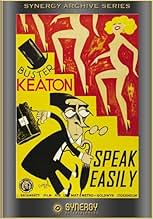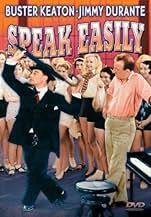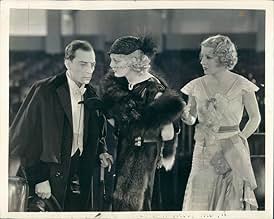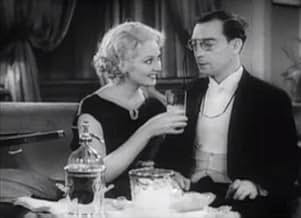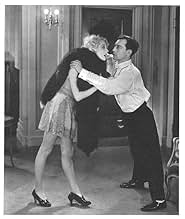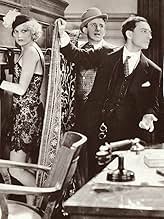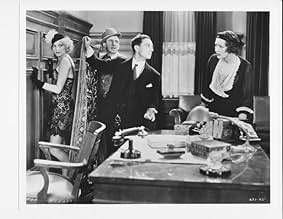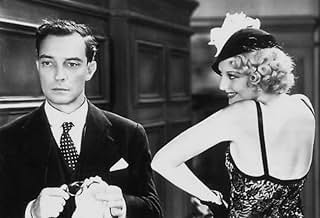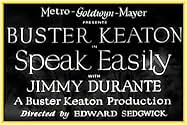NOTE IMDb
5,8/10
1,2 k
MA NOTE
Ajouter une intrigue dans votre langueA timid professor inherits a large sum of money and decides to fund a terrible musical.A timid professor inherits a large sum of money and decides to fund a terrible musical.A timid professor inherits a large sum of money and decides to fund a terrible musical.
- Réalisation
- Scénario
- Casting principal
Loretta Andrews
- Chorus Girl
- (non crédité)
Oscar Apfel
- Lawyer's Representative
- (non crédité)
Reginald Barlow
- Billington
- (non crédité)
Jack Baxley
- Tom - Sheriff's Deputy
- (non crédité)
Sidney Bracey
- Jenkins
- (non crédité)
Jim Farley
- Station Agent
- (non crédité)
DeWitt Jennings
- Sheriff of Lincoln County
- (non crédité)
Fred Kelsey
- Process Server
- (non crédité)
Avis à la une
I watched 'Speak Easily' one night and thought it was o.k., but missing something. Maybe Buster Keaton strangely speaking threw me off, or the labored line delivery of a leading lady. The next day I kept thinking about the movie, though. I couldn't get Durante's song out of my head, I kept trying to better remember Thelma Todd's first scene, I considered that maybe Keaton did do some funny falls and physical comedy. The next night I watched a scene with Thelma Todd as a conniving chorus girl trying to impress Buster and Jimmy with her sex appeal. A very funny scene, the actors excellent, their faces, their eyes, their silly expressions. So I watched another scene, their show is opening on Broadway. Buster in his blissful innocence botches every act. Again, I was laughing out loud, appreciating Keaton's clowning and tumbling. So the next night I watched the whole movie again, and this time I see it for the first time: It's Stupendous! It's Sensational! It's Sublime! Three great comedians! Todd dances! Durante sings! Keaton speaks! Sure it ain't poifect...but there's a lot of laughs in this picture.
Keaton fans, you will not "die a thousand deaths" if you view this. Nothing Keaton does is bad, if for nothing else then for his presence. That being said, Buster was a silent start who was best when doing stuff created by his own mind. By 1932, the silent era was dead and the studios owned the movies. That Buster Keaton of "Seven Chances" and "Steamboat Bill Jr." was no more. That could never be recreated.
Times changed, films changed, and Buster adapted. Better this Buster than no Buster.
The story is funny, and there is some amusing slapstick. Buster plays his role well, adds some Buster to it, and is believable as a clueless college professor. Jimmy Durante is larger than life, in a hammy sort of way, but it's a good contrast with Keaton if anything. The movie works, and the closing scenes the show on Broadway is madcap with a modicum of brilliance.
We can ask what if. What if the silent era had never ended? What if Keaton and Arbuckle had not been separated so suddenly? What if the studios had taken over the industry with their formulae? Look, this is a pretty good film. It's not Keaton being tragically reduced to nothing. (Such was never possible! The great ones always adapt.) The tragedy is what happened to Roscoe Arbuckle. What happened to Buster? He hung in there and made people laugh.
Times changed, films changed, and Buster adapted. Better this Buster than no Buster.
The story is funny, and there is some amusing slapstick. Buster plays his role well, adds some Buster to it, and is believable as a clueless college professor. Jimmy Durante is larger than life, in a hammy sort of way, but it's a good contrast with Keaton if anything. The movie works, and the closing scenes the show on Broadway is madcap with a modicum of brilliance.
We can ask what if. What if the silent era had never ended? What if Keaton and Arbuckle had not been separated so suddenly? What if the studios had taken over the industry with their formulae? Look, this is a pretty good film. It's not Keaton being tragically reduced to nothing. (Such was never possible! The great ones always adapt.) The tragedy is what happened to Roscoe Arbuckle. What happened to Buster? He hung in there and made people laugh.
There have been a lot of very perceptive comments made by previous reviewers and I don't have much to add.
I have to agree with those who said it was a rather flat comedy with flashes of wit and charm.
Keaton gives an interesting performance as Professor Post. It seems a bit of a parody on Harold Lloyd, but also a precursor to Danny Kay's professor character. The movie is wise when it centers itself around him, but it seems that the scriptwriter wrote it for Keaton to improvise wildly, only to find Keaton sticking to the script. I imagine there was some tension between him and the director, with Keaton simply giving in and following the director's orders.
Thelma Todd stands out. She lights up the screen and exudes a knowing sophistication that only a few other actresses (Jean Harlow, Mae West and Katherine Hepburn) reached.
Again, I don't think that anybody but Buster Keaton fans will enjoy the movie and only Buster Keaton fans will have a few laughs out of it.
I have to agree with those who said it was a rather flat comedy with flashes of wit and charm.
Keaton gives an interesting performance as Professor Post. It seems a bit of a parody on Harold Lloyd, but also a precursor to Danny Kay's professor character. The movie is wise when it centers itself around him, but it seems that the scriptwriter wrote it for Keaton to improvise wildly, only to find Keaton sticking to the script. I imagine there was some tension between him and the director, with Keaton simply giving in and following the director's orders.
Thelma Todd stands out. She lights up the screen and exudes a knowing sophistication that only a few other actresses (Jean Harlow, Mae West and Katherine Hepburn) reached.
Again, I don't think that anybody but Buster Keaton fans will enjoy the movie and only Buster Keaton fans will have a few laughs out of it.
What is the most harrowing movie ever made? The gynaecological nightmare of 'Cries and Whispers'? The acid psychodramas of Fassbinder? The discomfiting black comedy of 'Last House on the left? I'm sure for that portion of the film-loving public that tie their masts to the good ship Buster Keaton, there is only one answer - any one of his sound films.
I don't know what flayed my soul more poignantly in this movie - the grounding of Keaton's intricate and expansive physical art to humdrum slapstick; the painful hesitation of this master filmmaker with dialogue - not that he hasn't a lovely, comic voice, or that he can't make dialogue funny; it's just that the studio don't seem to have given him enough takes, and so he seems to be trying to remember his lines before he delivers, which only makes him - Keaton, not his character, look silly; or is it the humiliation of seeing Keaton caught up in a tawdry sex farce, when he has given us some of the richest accounts of romantic frustration in film?
No, I know what was most disturbing - having to watch Buster Keaton, cinema's greatest comedian, sit aside to observe Jimmy Durante doing his schtick. It is horrors such as this that get yer Dantes composing yer Infernos.
MGM seem to have got the curious idea that the best way to adapt Keaton to sound was to turn him into a Marx Brother, complete with verbal pedantry, elaborate, tedious 'clowning', shambolic slapstick, theatrical setting, triumph through chaos, and Thelma Todd. Keaton was just not that sort of comic, and where Groucho's malicious tongue and gleeful opportunism might just have made this plot work, Buster's socially inept professor can't, he is too studied and predictable.
What Buster needed was to be allowed experiment like Lang in 'M', or Rene Clair; he would never have tried to hold back the tide like Chaplin. When a film like 'The General' is alluded to - messing about with trains - the loss becomes even more apparent.
And the thing is, in patches amid the flat direction, the film isn't all that bad - there is an excellent jolt when a camera on the bus leaves Keaton alone at a railway station; and the denouement, if hardly original, is at least livelier than what went before. There is something almost endearing about the way Keaton slows down a plot that needs all the zip it can get.
There is a film in here about loneliness, emotionally paralysing order, the numbing effects of education etc., struggling to get out. The best way to appreciate this film is to watch not the narrative of Professor TZ Post, but of emasculated genius Buster Keaton, trapped in a prison of mediocrity, confounded by new technology, mocked by a malevolent fate (in this case the studio), retaining a stoical grace. Looked at like that, it becomes a kind of masterpiece.
I don't know what flayed my soul more poignantly in this movie - the grounding of Keaton's intricate and expansive physical art to humdrum slapstick; the painful hesitation of this master filmmaker with dialogue - not that he hasn't a lovely, comic voice, or that he can't make dialogue funny; it's just that the studio don't seem to have given him enough takes, and so he seems to be trying to remember his lines before he delivers, which only makes him - Keaton, not his character, look silly; or is it the humiliation of seeing Keaton caught up in a tawdry sex farce, when he has given us some of the richest accounts of romantic frustration in film?
No, I know what was most disturbing - having to watch Buster Keaton, cinema's greatest comedian, sit aside to observe Jimmy Durante doing his schtick. It is horrors such as this that get yer Dantes composing yer Infernos.
MGM seem to have got the curious idea that the best way to adapt Keaton to sound was to turn him into a Marx Brother, complete with verbal pedantry, elaborate, tedious 'clowning', shambolic slapstick, theatrical setting, triumph through chaos, and Thelma Todd. Keaton was just not that sort of comic, and where Groucho's malicious tongue and gleeful opportunism might just have made this plot work, Buster's socially inept professor can't, he is too studied and predictable.
What Buster needed was to be allowed experiment like Lang in 'M', or Rene Clair; he would never have tried to hold back the tide like Chaplin. When a film like 'The General' is alluded to - messing about with trains - the loss becomes even more apparent.
And the thing is, in patches amid the flat direction, the film isn't all that bad - there is an excellent jolt when a camera on the bus leaves Keaton alone at a railway station; and the denouement, if hardly original, is at least livelier than what went before. There is something almost endearing about the way Keaton slows down a plot that needs all the zip it can get.
There is a film in here about loneliness, emotionally paralysing order, the numbing effects of education etc., struggling to get out. The best way to appreciate this film is to watch not the narrative of Professor TZ Post, but of emasculated genius Buster Keaton, trapped in a prison of mediocrity, confounded by new technology, mocked by a malevolent fate (in this case the studio), retaining a stoical grace. Looked at like that, it becomes a kind of masterpiece.
Thelma Todd brings burlesque to a script replete with gags, some of them funny, as when Keaton carries her folded up looking like a filled bag. Pre-Code license pervades and Todd takes this to new realms. The Broadway show as conceived is quite brilliant with snow flakes, costumes, sets, dancers, music, balloons and genuine art, for a few moments, before Keaton tears it all apart. The Producers, Night at the Opera, owe somewhat. You don't get such a steady stream of sight gags and stunts, as with the trains, unless it's Keaton. Not many big laughs, but surprising in its disregard for conventions of good taste audiences might expect to see lived up at an MGM movie. Hedda Hopper does a great job as the tasteful Mrs. Peets.
Le saviez-vous
- AnecdotesSecond of three films in MGM's pairing of Buster Keaton and Jimmy Durante as a comedy team. The other pictures were The Passionate Plumber (1932) and Le roi de la bière (1933).
- GaffesWhile Professor Post (Buster Keaton) is dragged by the train, clutching his luggage, his hat flies off and he is unable to grab it. In the next shot, his hat is once again firmly on his head.
- Citations
Eleanor Espere: Tell me, Timmy. Have you ever seriously thought of marriage?
Professor Post: Yes... that's why I'm single.
- ConnexionsFeatured in Il était une fois Hollywood (1974)
- Bandes originalesGood Times Are Here Again
(1932) (uncredited)
Music by David Snell and Charles Maxwell
Lyrics by Samuel Marx
In the score during the opening credits and at the end
Played on piano by Jimmy Durante and sung by the chorus at the opera house
Played often in the score
Meilleurs choix
Connectez-vous pour évaluer et suivre la liste de favoris afin de recevoir des recommandations personnalisées
- How long is Speak Easily?Alimenté par Alexa
- Buster Keaton and Ruth Selwyn are related by family. How?
- What do Buster Keaton and Hedda Hopper have in common?
Détails
- Date de sortie
- Pays d’origine
- Langue
- Aussi connu sous le nom de
- Les millions qui tombent du ciel
- Lieux de tournage
- Chatsworth Depot, Chatsworth, Californie, États-Unis(train station)
- Société de production
- Voir plus de crédits d'entreprise sur IMDbPro
- Durée1 heure 22 minutes
- Couleur
- Rapport de forme
- 1.37 : 1
Contribuer à cette page
Suggérer une modification ou ajouter du contenu manquant

Lacune principale
By what name was Le Professeur (1932) officially released in Canada in English?
Répondre
